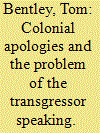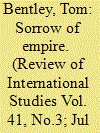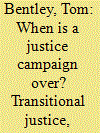| Srl | Item |
| 1 |
ID:
158912


|
|
|
|
|
| Summary/Abstract |
Can state apologies help reconciliation between former coloniser and colonised? Much of the literature on political apologies is optimistic regarding their potential to aid reconciliation. Even critical work frequently dispraises particular case studies, while maintaining a normative commitment to apology. Building on a growing postcolonial literature on the subject, this article contributes a more fundamental critique of colonial apology. It argues that its inherent structure entails a format that accords the politician of the transgressor state an elevated speaking position. This results in the ritual being predisposed to problematic representations of the colonised and sanitised narratives of the transgression. The argument is situated within Edward Said’s considerations on representation in the colonial process.
|
|
|
|
|
|
|
|
|
|
|
|
|
|
|
|
| 2 |
ID:
139593


|
|
|
|
|
| Summary/Abstract |
Unexpectedly, several prominent European countries have begun to issue official state apologies to their former colonies. What does this proliferation of official colonial sorrow from such countries as Germany, Belgium, Italy, and Britain reveal about the normative tenets of the contemporary international order? This article analyses colonial apologies as crucial symbolic and ritualistic sites where state elites project liberal credentials and affirm liberal normative tenets in the international system. Specifically, the article demonstrates how these apologies for colonial atrocity appear to reinforce liberal conceptions of human rights, the renunciation of violence, cordial relations with formerly colonised states, and commitments to state accountability and transparency. Yet, textual analysis of several state apologies reveals that these performatives simultaneously contradict each of these liberal tenets. It finds that – even in apology – political elites reflect ambivalence about certain human rights violations; persist in glorifying or sanitising the violent colonial past; recycle paternalistic and hierarchical discourses and policies towards the apology's recipients; and offer contradictory notions of the state's historical responsibility. In exposing these performative contradictions of empirical sorrow, the article seeks to expand the discipline's understandings of, and dilemmas within, a key performative and ritualistic legitimation strategy whereby liberalism reproduces itself in the international system.
|
|
|
|
|
|
|
|
|
|
|
|
|
|
|
|
| 3 |
ID:
182615


|
|
|
|
|
| Summary/Abstract |
This article explores the political, strategic and emotional issue of victim groups deciding to continue or discontinue central components of a justice campaign in the aftermath of receiving ‘truth’. Drawing on in-depth interviews, the article focuses on relatives and other stakeholders’ varying positions on (dis)continuing the annual Bloody Sunday commemoration march after the publication of the Report of the Bloody Sunday Inquiry and the UK Prime Minister’s apology for the massacre. I demonstrate that there has emerged an, at times, acrimonious schism between those who feel the apology and report were sufficient to stop the march and those who believe them to be insufficient. Thus, while much of the literature on political apology evaluates its effects on the dyadic relationship between victim and perpetrator, this article develops Sara Ahmed’s concept of ‘overing’ to demonstrate that the ostensible moment of truth can create unanticipated and deleterious intra-victim tensions. The article concludes by suggesting practical measures emerging from the findings that other justice campaigns may consider.
|
|
|
|
|
|
|
|
|
|
|
|
|
|
|
|